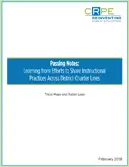Today, an increasing number of districts and charter schools are collaborating across sector lines to improve teaching and learning. Our research has identified three core ways districts and charters are partnering to share key instructional practices: 1) colocating schools to encourage learning from each other; 2) creating residencies and fellowships to train teachers and leaders in a particular approach; and 3) sharing resources and providing professional development trainings and workshops.
Case studies in Chicago, Boston, and New York City
In our assessment of the national landscape on instructional collaboration, we conducted case studies of three programs that promote the sharing of high-impact professional development: the Summit Learning Program in Chicago Public Schools, the Boston Educators Collaborative in Boston, and Uncommon Schools’ Impact partnership in New York City. In each, staff reported improved district-charter relationships at the system level and willingness among educators to collaborate across sector lines. Additionally, in the Summit Learning Program and Uncommon Schools’ Impact work, we found early evidence of improved student engagement and outcomes.
Significant challenges included extending the work beyond early adopters, transferring discrete instructional practices to less coherent environments, and addressing district-level policy barriers.
Recommendations for education leaders to share key instructional practices
For education leaders who are starting efforts to share instructional practices, we recommend the following:
- Pay attention to local contexts.
- Be clear on non-negotiables.
- Secure commitment from district, charter, and other partner organizations.
At the moment, collaboration efforts are successfully engaging early adopters. Moving forward to meaningfully improve students’ educational experiences will require district leaders to rethink structures like staffing guidelines, grading systems, and scheduling systems. Our ongoing work on district-charter cooperation will continue to track promising instructional collaborations.





